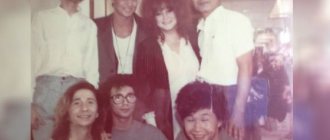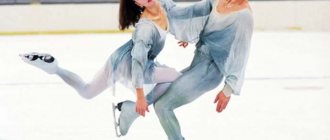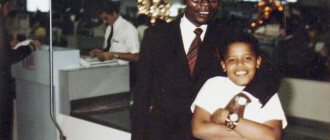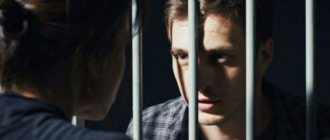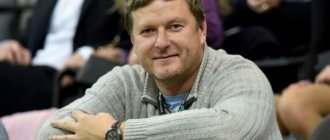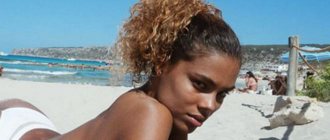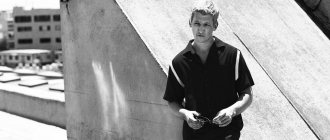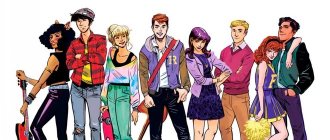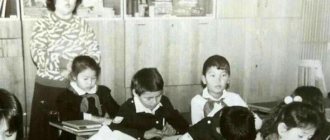Biography
The best football player in the world. One of the greatest players. A true champion. Unique. An incredible talent with extraordinary technical qualities. An excellent playmaker and a true organizer. Ronaldinho was awarded these epithets by his equally titled colleagues Pele, Maradona and Kaka. And I must admit, they were not mistaken.
Childhood and youth
On March 21, 1980, a third child, a son, was born into the family of shipyard worker Joao de Assis Moreira and nurse Miguelina Eloy Assisdos Santos. The boy was given the name Ronaldo. Twenty years later, the football and entire sports world will recognize him as Ronaldinho.
Ronaldinho as a child
The family lived in Brazil, in one of the largest cities of Porto Alegre. My father worked part-time in the parking lot of the Gremio football club, winner of the Intercontinental Cup and two-time winner of the Libertadores Cup. It is not surprising that the sons loved this sport in all its diversity - both futsal and beach. Moreover, it is a Brazilian tradition to give a soccer ball as a gift for a first birthday.
Ronaldinho came to football after his older brother Roberto, who showed great promise as a striker for Gremio and participated in the 1987 World Junior Championship. To motivate Roberto to play, the club gave him a villa in a prestigious area. But a knee injury ended his brother's career.
Ronaldinho and his older brother Roberto
Ronaldinho received his nickname, meaning "little Ronaldo", at the Langendonk football school, which he attended from the age of 7. And already at 13, the Brazilian media began writing about him. Then his futsal team Belo Horizonte won the match with a crushing score of 23:0. All goals were scored by Ronaldinho.
Biography and career of a football player
Ronaldinho was born the third child in the family of a shipyard worker and a saleswoman. His father, Joao da Silva Moreira, like other Brazilian men, played football at the amateur level in his free time.
It was he who became the first coach of little Ronaldinho, as well as his older brother Roberto de Assis, who also became a professional football player. As Ronnie himself later admitted, the example of his older brother helped him in many ways in life.
It was then, as a child, that Ronaldinho honed his magical technique by juggling a tennis ball. In an interview he explained this:
“I once saw Maradona juggling an orange and immediately tried to repeat it. Then I came up with a fun thing for myself: in the living room I tried to throw a ball behind my back, throwing it over a chair, and running around the chair to catch it.”
Ronaldinho's play in futsal and beach soccer also contributed to the development of filigree technique.
"Gremio"
1998-2001
For the main team of Gremio, in whose system Ronaldinho has been since 1995, the footballer made his debut at the age of 18 and immediately took off right away. 8 goals in the debut season, 33 in the second and an absolutely fantastic result - 41 goals in 49 matches of the 2000 season! I'm not talking about assists.
A year earlier, Ronaldinho made his debut in the first Brazilian national team and performed brilliantly at the Confederations Cup. It is clear that European clubs became interested in such a talent.
"Paris Saint-Germain"
2001-2003
This is how Ronaldinho ended up in Paris. It must be said that PSG was not a top club at that time - a strong middle peasant in the French championship, which occasionally, when a good squad was selected, won some kind of trophy.
So initially the Parisian club was seen as a springboard for a gifted footballer.
Already in the first season, the Brazilian became a starting player - Ronaldinho played 48 matches in which he scored 13 goals. With his performance, Ronnie earned a T-shirt with the iconic number 10, under which he began to play for PSG the very next season.
The following season, Ronaldinho continued to delight Parisian fans with his feints and goals. He was especially successful in his matches against Paris’s principal rival, Olympique de Marseille. PSG won both meetings and Ronaldinho scored in both - two goals at the Parc des Princes and one at the Vélodrome.
But Ronnie's efforts were clearly not enough - Paris Saint-Germain finished in 11th place and lost the French Cup final to Bordeaux. The lack of opportunity to compete for trophies forced Ronaldinho to declare his desire to leave the club.
Barcelona
2003-2008
Just at this time, Joan Laporta was elected president of Barcelona, which was going through hard times. One of the points of his election program was the invitation of new stars, in particular David Beckham. True, the Englishman left in the opposite direction - to Madrid, but Ronaldinho, Samuel Eto'o, Rafa Marquez, Deco arrived in Catalonia.
Under the leadership of young coach Frank Rijkaard, this team set about bringing titles back to the Camp Nou. Two championships, the Spanish Super Cup and the long-awaited, after a 14-year break, second victory in the Champions League.
Ronaldinho became one of the leaders and the main decoration of that “blue garnet” team. Moreover, he started playing right away, becoming the best legionnaire of Examples in the very first season and one of the contenders for the Golden Ball.
And the best season for Ronaldinho was the 2005-2006 season, which brought him the Golden Ball for the best football player in Europe. In the same season, he set his personal record for scoring in European teams: 26 goals in a season (he scored more for Brazilian clubs). And after his double against Real Madrid, the Santiago Bernabeu applauded Ronaldinho as he left the field - an unprecedented incident in the history of the Classico.
And that season was also notable for the fact that it was then that Lionel Messi began to constantly play in the team’s core. As the Argentine himself said, Ronaldinho was an example for him.
Ronaldinho's last season in Barcelona did not go well. The reason for this was injuries, and, to be honest, the Brazilian’s attitude to training. Apparently, the impulsive and emotional football player needed new motivation, if you like, a new challenge.
"Milan"
2008-2011
This challenge came from Milan, who paid Barcelona 25 million euros. It’s interesting that before this Ronnie received a very lucrative offer from Manchester City from a financial point of view, but it was not he who wanted to go to England.
40 thousand spectators gathered at the San Siro for Ronaldinho's performance. He came out wearing T-shirt No. 80 - the year of his birth, since his favorite ten was occupied by Clarence Seedorf.
Ronaldinho started off great, resembling the best examples of himself with every match, but his best season in Milan was the next one - the 2009-2010 season.
He finally reached the peak of his form, scored 17 goals during the season, and became the best assister in Serie A with 15 assists.
But, unfortunately, the next championship season for Milan was far from the best in the footballer’s career. Nightclubs, criticism of the head coach, conflicts with players - apparently Ronaldinho could not get along in one place for a long time.
Other clubs
2011-2015
In fact, parting with Milan was the end of Ronaldinho's career. No, he also played for four whole years for the Brazilian Flamengo, Atlético Mineiro and Fluminise, and the Mexican Queretaro, scoring and even winning titles.
But Ronaldinho never reached his previous level, only occasionally demonstrating the game that fans expected from him.
Brazil national team
1999-2013
In the summer of 1999, 19-year-old Ronaldinho made his debut in the first Brazilian national team, after which he took part in the victorious Copa America 99. Ronnie’s contribution to that victory can hardly be called decisive - he took part in four of the team’s six matches, scoring one goal against the Venezuelan national team (7:1).
And literally a week later, Ronaldinho went to the Confederations Cup as part of the Brazilian national team. It was a completely different team, made up mainly of players playing in Brazil. And if against the backdrop of stars from Europe, such as Ronaldo and Rivaldo, Ronaldinho was somewhat lost, here he showed himself in all his glory, scoring six goals in five meetings.
Ronaldinho went to the 2002 World Cup as a full-fledged player in the main squad. That was the first time I saw a Brazilian in action - the French championship was not shown in Russia at that time. I must say that Ronaldinho was impressive. He was impressive even against the backdrop of such monsters as Ronaldo and Rivaldo. And his goal in the quarter-finals of England, when he threw the ball over David Seaman's collar from 35 meters, was still the stuff of nightmares for English fans.
- DAVID SEAMAN AND OTHER GOALIE BLUES.
Almost immediately after the goal, Ronnie was sent off from the field. Although there was a foul, it still didn’t warrant a straight red card, in my opinion. Ronaldinho missed the semi-finals, but in the final he entered the field and helped the Brazilian team win their fifth world champion title.
Four years later, Zubastic No. 2 again went with the national team to the World Championships. In Germany, the Brazilians looked even stronger than in 2002 - the core of that team remained, and they were joined by such players as Andriano, Kaka, Robinho.
Having easily won the group and defeated the Ghana team in the 1/8 finals, the Brazilians looked like clear favorites in the match with the aging and heavy French team. But the French were able to win 1:0; Brazil did not get revenge for the defeat in the 1998 World Cup final. It must be said that the pentacampeons themselves made every effort to do this, scoring only one shot on target in Fabien Barthez's goal in 90 minutes.
And another scandal broke out around Ronaldinho - immediately after the match, he and Andriano flew to Barcelona, where both were seen having fun in a nightclub. It is clear how Torsida reacted to this story.
Since 2008, Ronaldinho began to be called up to the national team only sporadically, and in 2010, Carlos Dunga did not include him in the national team’s squad for the World Cup, although at that time he was only 30 years old. In total, he has 96 matches and 33 goals for the national team.
Football
Ronaldinho's career began, of course, at Gremio. The teenager joined the team at the age of 15. He signed his first professional contract and managed to play at the 1997 World Junior Championships.
Two years later, Ronaldinho made his debut in the national team. After a brilliant performance at the Confederations Cup, clubs from the Old World became interested in the young talent.
The Brazilian's biography changed dramatically when the young football player ended up in the French Paris Saint-Germain. The transition to this club was not easy. According to Pele's Law, a player was released to another club subject to compensation that was two hundred times the player's salary. And in 2001, the contract with Gremio was ending, and Ronaldinho had no intention of renewing it.
Ronaldinho at PSG
In the end, the French paid compensation in excess of 5 million euros, but the home club, nevertheless, remained dissatisfied.
PSG was then considered mediocre and was seen only as a springboard for Ronaldinho. After Paris Saint-Germain placed 11th in the national championship and lost in the fight for the French Cup, Ronaldinho left the club.
Ronaldinho at Barcelona
The Spanish Barcelona did not fail to capture such a trophy. Manchester United and Real Madrid also took part in the fight for the talented foreign player. Joan Laporta's team personally contacted Ronaldinho and his brother, who became the footballer's personal agent. The result of telephone conversations was a contract worth 32 million euros.
Ronaldinho became the star of the Blaugrana. From the very first season, fans saw a brilliant game, beautiful goals and signature tricks. The most famous trick performed by the Brazilian is the "elastico", which is sometimes also called the "flip flop" or "snake".
Ronaldinho with the Ballon d'Or
The athlete said that his game is improvisation. An attack is generally impossible without this, especially in a situation where seconds are allotted to make a decision. A football player should not show the same game; unpredictability should keep the opponent off balance.
Two FIFA Golden Balls as the best football player in the world, the best player in the Champions League, twice the champion of Spain - this is an incomplete list of the striker’s awards. In the 2005-2006 season, he set a personal record for performance in European teams.
Ronaldinho in the game against Real Madrid
The player’s “cost” grew exponentially. In the 2006-2007 season, the English Chelsea offered 70 million euros for the transfer of Ronaldinho, but the Catalans refused.
In 2007, Ronaldinho received Spanish citizenship. At the same time, another future football legend, Lionel Messi, appeared in the first team of Barça. As the Argentine himself said, Ronaldinho was an example for him.
Ronaldinho and Lionel Messi
Not the most brilliant performances at the World Cup in Germany and the 2008 Olympics, a serious injury and subsequent withdrawal from the team forced Ronaldinho to look for a new club.
There were still many teams wanting to see Ronaldinho in their squad. The Italian Milan was lucky. The footballer spent there from 2008 to 2011, despite the fact that he received a more lucrative offer from Manchester City. But he simply did not want to go to England.
Ronaldinho at Milan
The first Italian season was difficult, everything was new - the language, the people, the environment. As Ronaldinho admitted in an interview, he had to persistently prove that he was worthy of playing in the first team.
But the golden period in Ronaldinho's biography is over. Conflicts began with the coaching staff. The football player was increasingly seen in nightclubs in violation of the rules. This immediately affected the quality of the game, performances became uneven. The press wrote more about the player's behavior outside the stadium than about the Brazilian's signature style.
Ronaldinho in the Brazilian national team
The contract amounts went downwards. The clubs changed one after another. In 2011, Ronaldinho moved to Flamengo, followed by Atlético Mineiro in 2012. In 2014, he signed a one-year contract with the Mexican Queretaro. Ronaldinho then played for the Peruvian club Cienciano and the Ecuadorian club Barcelona (Guayaquil). In 2015, he returned to Brazil, to the Fluminense de Feira club, where he spent only a few months.
Ronaldinho: the story of a wizard
The Great Ronaldinho / Photo - Getty Images On Monday, January 15, the legendary Brazilian midfielder Ronaldinho
decided to end his career.
It cannot be said that this news thundered or excited the public: the Brazilian has not performed at a high level since 2011, when he parted ways with his last European club in his career, Milan. 2017 brought fans farewells to many idols. Francesco Totti
,
Philipp Lahm
,
Kaka
,
Andrea Pirlo
and others ended their careers Ronaldinho remained perhaps the last idol of the early 2000s (a time when Messi and Ronaldo had not yet sparkled on the starry horizon). But it’s not the fact that a star is leaving football that’s important! A genius, a sorcerer and the most creative performer of the romantic football era is leaving the game.
Let's remember those episodes of Ronaldinho's career that will definitely let you understand how the wizard played.
23:0
At the age of 7, Ronaldinho went to Langendonk Football School. It was then that he received his nickname - “Ronaldinho”, which means “little Ronaldo”, being the youngest among the players of the youngest team “Gremio”, where he joined at the age of 13. The forward (attacking midfielder, whatever you like) was incredibly smiling. But at the age of eight, the baby had to go through one of the most difficult moments in his life - the death of his father. Perhaps this is why many people associate Ronnie with a wide, sincere smile: troubles and failures taught him to respond to everything with a calm look and a positive expression on his face.
People first started talking about Ronaldinho when he was 13 years old. The striker then played for the Belo Horizonte team, at the same time playing mini-football and beach soccer. Perhaps this diversity helped the “wizard” learn to play one-on-one and not be afraid to take responsibility. The entire Brazilian media began to trumpet him as a future star after his individual beating of the local club. His team beat the opponent with a score of 23:0, and the future winner of the Golden Ball chalked up all the goals scored. Some people built their career bit by bit, but not him. Someone had a step forward, but he had a leap. Some were remembered for their hat-tricks, and Ronnie, in turn, scored 23 goals per game. True, his jumps down were also stronger than the others.
Ronaldinho with his brother
First steps in professional football
Ronaldinho received his first contract in 1997: the forward signed an agreement with Gremio, thanks to which the Brazilian club would later become rich. People really started talking about his talent after the 1999 America's Cup. It was there that he showed himself in such a way that he attracted attention from European super-clubs. The Wizard came on as a substitute in the Brazil-Venezuela match 20 minutes before the final whistle. In the first match for his team at that tournament, the 21st number of the then Selessão dealt with the defender, throwing him over (which would later become one of his hallmarks of the game), and then beat the opposing goalkeeper with an accurate shot into the near corner. Beauty.
It is not surprising that the Gaucho’s play attracted the interest of European giants to him. The magician became a public favorite. While performing at Gremio, he began to gain confidence, demonstrated a high level of dribbling and excellent speed. All this led the Brazilian to a contract with PSG.
First European experience
PSG in 2001 is, of course, not what the current team is, which is the uncontested leader in Ligue 1. But one should not assume that the club was weak. No matter how it is! Gabriel Heinze began performing
,
Nicolas Anelka
Jay-Jay Okocha
and the current Tottenham helmsman
Mauricio Pochettino
have already gained some fame .
By the way, Ronaldinho did not get lost in such company. Moreover, in the first season, the nominal midfielder, with 13 goals scored, became the team's top scorer and helped the Parisians win the Intertoto Cup. The Brazilian's first season turned out to be exemplary. Ronnie was the best on the field for his team, confidently dealing with opposing defenders, making solo passes almost from his own penalty area, spinning opponents in all directions, literally mocking them. After his first super-successful season with PSG, the toothy guy, frankly speaking, caught a star, which was noted more than once by coaches who knew him and journalists. No, he still never ceased to delight everyone with his brilliant dribbling, but the Brazilian did this exclusively in important matches. It would seem great, but Ronnie simply refused to play to the maximum in ordinary meetings of the French championship, walked around the field and was only a shadow of himself. He was damn good, but just as lazy. Photo - Reuters
World Cup 2002
2002 was a fateful year for our hero. Due to the fact that Ronaldinho showed himself well at PSG, the head coach of the strongest world team at that time, Luiz Felipe Scolari
there was no question whether it was worth calling 22-year-old Ronnie to the World Cup.
It cannot be said that this was the Ronaldinho World Cup, but he was one of those who were spectacular in the Selessão attack and scored one of the most important goals for his team in the tournament. It is noteworthy that the Brazilian scored almost all his important goals not somehow, but with soul, beautifully. This happened in the quarterfinal match against the English. Ronnie threw the ball over David Seaman's
from 30 meters away!
The goal was the winning one, and after seven minutes the hero of the match got tired of dragging his team, and he earned a red card, fouling Danny Mills
.
At that World Cup, the future Barcelona legend tormented the opponents' defense along with the more experienced Ronaldo and Rivaldo. As a result of their performances, the RRR trio is the strongest fighting fist of the World Cup in Korea and Japan, and Ronaldinho personally is a rising star in world football.
Transfer to Barcelona
Ronaldinho played another season in Ligue 1, after which he moved to a club that would make him a special player. In 2003, the management of Barcelona did not skimp and paid more than 23 million euros for the striker. The Catalan giants were a team that suited the Brazilian perfectly. It is there, like nowhere better, that they know how to work with young people and players who are about to rise to the rank of stars. Thinking, fast, technical, with a great shot and exciting dribbling, Ronnie is the main purchase of Barcelona in the 2000s. The Catalans never made a mistake with a player who would later help them take the Champions League title. From the very first season, the Brazilian striker established himself as the leader of the Blaugranas, was recognized as the best foreign player in Primera and even became the FIFA player of the year, but the 2004 Golden Ball went to the current head coach of the Ukrainian national team, Andrey Shevchenko
.
Ronaldinho is presented as a Blaugrana player / Photo - Barcelona press service
Ballon d'Or 2005
It rarely happens that the award for the best player of the year is given to a player whose team stopped playing at the stage of the 1/8 finals of the Champions League. However, Ronaldinho is an example of the fact that this prize is, first of all, an individual award, and one-on-one he had no equal in the world. Even in the match lost to Chelsea in the 1/8 finals in the away match, the Brazilian scored a double, which, however, could not save Barcelona from defeat from Jose Mourinho’s
.
However, in the 2004/2005 season, Ronnie still led his club to victory in the Spanish Championship, playing even better and scoring more goals. Result: he won the 2005 Ballon d'Or, significantly ahead of Frank Lampard
and
Steven Gerrard
.
Photo - Reuters
Victory in the Champions League
In 2006, Ronaldinho was obliged to again receive the award for the best player of the year, but the Golden Ball then went to the captain of the triumphant Italian national team Fabio Cannavaro
.
The Italian defender may be the least deserving recipient of the prestigious prize in football. Ronaldinho, in turn, did not relax or give up ground during the 2005/2006 season, but continued to demonstrate real magic on the football field. The Blue Garnets celebrated their victory in the Spanish Championship as usual and, what is very important, did not stop halfway to the Champions League final, but reached the decisive match, where they beat London's Arsenal. And again, the main creator on the field of victories for the Catalans was the smiling, long-haired leader of the attack, who was recognized as the best player in the most prestigious European tournament, scoring seven goals and giving four assists in that draw. It was that special season for the Blaugranas that was the best for Ronaldinho in his career, but, apparently, he was not destined to receive a second Ballon d'Or. Victory in the Champions League / Photo - Reuters
Applause at the Santiago Bernabeu
November 19, 2005. Meeting between Real Madrid and Barcelona at the Santiago Bernabeu. Samuel Eto'o opened the scoring
.
But he was not destined to become the hero of that meeting, or of his club as a whole. Ronnie gave one of the best matches of his career, scoring twice against Iker Casillas
.
Moreover, he did it as if he had descended from heaven in order to show mere mortals what a genius in football is. Such solo passes could only be made by Diego Maradona
and
Lionel Messi
, which definitely puts the Brazilian on a par with the great players.
Real Madrid fans were so shocked by the skill of the phenomenal player that they burst into applause for the football player who is on the side of the main enemy of Los Blancos. It seems that the real “galacticos” are not only Real Madrid in the early 2000s...
Handing over the crown to Lionel Messi
The greatest players became friends when Lionel Messi
they were just starting to get close to the Barcelona first team. By that time, Ronaldinho was already great and helped the little Argentine become cooler than he was. Ronnie’s subtle pass and high-quality performance, which ended with a goal in 2005, tell a good story about the interaction between the greats:
Messi himself has repeatedly noted that it is largely thanks to the “wizard” that he became what he is:
“He helped me a lot when I took my first steps. As soon as I made it to the first team, he began to take care of me, helping me with everyday problems and in my relationships with the whole team. I will never forget how much attention he paid to me. It is by deeds like this that truly good people are recognized. And on the field he was one of the best partners I have ever played with. Everything was easy with him. He is my friend and I will never forget him. We became very close when we worked together. And like I said, he was always good to me.”
In turn, Ronaldinho said that Messi is a diamond in himself:
“He had talent from birth and developed it from an early age.
When he ended up in Barcelona, he was already a ready-made player, a professional. It brings me joy to watch him succeed, and it gives me great pleasure to know that I was there when he began his career. It’s cool that he scored his first goal in his professional career with my assist. But I didn’t teach him anything myself; at that time he was already a gifted player. When I first found myself at Barça, I often heard that this club was producing a very talented football player. When he started training with us, this information was only confirmed.”
It is symbolic that after Ronaldinho left the club, it was the Argentine youth who took the number 10 and fully justified the responsibility that falls on a player with a “ten” on his back. Especially when you become the successor of a great predecessor.
Last challenge for Ronaldinho
The Brazilian began to fade away while still playing at Barça. This is due to frequent injuries and addiction to nightlife, which cannot be taken away from the great image of Ronaldinho. But even this did not negate the fact that he is good and can still reach the previous level, which is what the Milan management believed in, not stinting with 21 million euros (+4 million in possible bonuses). The gaucho performed well at first, scoring in important matches, but the rest of his European career was like mountains when you look at them from the top: flat in some places, ups in others, dips in others, but the point is that everything goes down on an inclined As a result, over three years in Milan, the Brazilian scored 20 goals and played 76 matches in all tournaments.
Photo - Reuters
Describing the football path that Ronnie went through, I would like to call it bright. He shone on the field more than others, scored the most beautiful goals, made incredible leaps in terms of developing his own qualities and passed the ball just as confidently. It's a pity that his star didn't burn as long as he would have liked. But the 2005 Golden Ball, victories at the 2002 World Cup and the Champions League in the 2005/2006 season are only a small part of the clear evidence that a truly great player is leaving football.
This gesture was later adopted by Lionel Messi / Photo - Reuters
Maxim Didenko, XSPORT.ua
Personal life
While still playing at PSG, Ronaldinho said that he had never fallen in love, much less suffered from unrequited love. And he prefers smart girls with a sense of humor. Officially, Ronaldinho is not married, but has a son. The child's mother is dancer Janaina Nattianella Viana Mendez. The son, born in 2005, was named after his grandfather, Ronaldinho's father.
Ronaldinho and his girlfriend Janaina
In the company of the sultry handsome man (the footballer's height is 181 cm, weight - 78 kg), French model Alexandra Paressan and Romanian Liliana Cheveresan were seen. Although Ronaldinho calls the soccer ball his first love.
It would seem that things were going seriously with the first beauty for “Zubastik the Second” - the football player even introduced the girl to her mother and showered her with expensive gifts. What was the cost of the usual act of sending a charter plane to pick up a friend’s beloved dog? But Alexandra allowed herself to be too frank with the media. And Liliana preferred her own career.
Ronaldinho and his son
Ronaldinho did not forget to employ his closest relatives: brother Roberto is a personal agent, sister Daisy is a media relations manager. But Ronaldinho does not flaunt his family life. The official Instagram contains mostly photos from games, meetings with fans and friends, and, of course, your own.
Ronaldinho now
For the last two years, Ronaldinho, as a football player, has been unemployed. Advertising contracts and participation in charity matches do not count. In the summer of 2020, the athlete released his own mobile application “Emojinho” based on Android and iOS.
Ronaldinho and Ronaldo
In the same year, Barcelona, as part of promoting its own brand in America, opened a new office and football school in New York. Ronaldinho is the official ambassador for the Blaugrana's commercial expansion in the United States.
In 2020, together with Hollywood stars Jean-Claude Van Damme, Christopher Lambert and boxer Mike Tyson, he participated in the filming of the film “Kickboxer. Retribution". Ronaldinho is no stranger to cinema. Back in 2002, he appeared in a cameo role in the film “Play Like Zizou.” There are also films with the participation of a football star - “Clone”, “Brazil Avenue”, “Reservoir Dogs”.
Ronaldinho in 2017
In 2020, news feeds spread two stories. According to agent Roberto de Assis, Ronaldinho plans to return to professional football and sign a contract with a team that will play in the Copa Libertadores. The most likely contender is the leader of Uruguayan football, Nacional.
According to Globoesporte, the former striker is being considered for the Brazilian national futsal team. In any case, a discussion took place on the terms of joining the Sorocaba club with the legendary mini-footballer Falcao. Previously, Ronaldinho played in the Indian Futsal League. He left it after receiving an offer to become a goodwill ambassador at the Paralympics in Rio de Janeiro.
Football career of Ronaldinho
Ronaldinho played in the Gremio youth team from the age of 15, and at the same time was interested in futsal and beach soccer. In 1997, he signed his first professional contract with the club and made his debut at the World Cup as part of the Brazilian youth team. On the back of his shirt was the name Ronaldo.
Ronaldinho began his football career at Gremio. In 1998, during the Libertadores Cup match, Ronaldinho made his debut in the main team of Gremio. 1999 brought the young man his first trophy - winning the state championship. Football connoisseurs appreciated his play, dribbles, breathtaking passes, goals... Club owners also noticed this. Ronaldinho's best goals In December 2000, Ronaldinho, secretly from the management of Gremio, signed a preliminary contract with Paris Saint-Germain (France). Subsequently, the Brazilian club announced that the footballer would move to the French for two years for €6.4 million. However, a month later, Ronaldinho signed a five-year contract worth €5.1 million. The Gremio management was unhappy, and the fans boycotted Ronaldinho. Over the past month, every time he entered the field, he was accompanied by whistles and hoots. In total, he played 35 matches for Gremio, scoring 14 goals.
Ronaldinho left Gremio with a scandal. Moving to Paris Saint-Germain, he started playing under number 21, later changing it to 10. The first match with his participation turned out to be a draw. Perhaps that is why for the next six months Ronaldinho either played in the main team or sat on the bench. He scored his first goal for the club only on October 13, 2001. However, in the 2002/2003 season, he fully demonstrated his talent, in particular, experts noted his outstanding performance in the French Cup. However, the club did not qualify for the European Cup, and therefore Ronaldinho left the team.
Ronaldinho played for Paris Saint-Germain for 2 seasons. On July 19, 2003, Ronaldinho was bought by Barcelona. The negotiations were difficult; his transfer cost the Spanish club €32.25 million. In his first season, he scored 22 goals and helped Barca take second place in the Copa del Rey. At the same time, FIFA awarded him the title of best football player in the world.
In 2005, Ronaldinho was recognized as the best football player in the world. The next two seasons were no less successful: with a large lead over his main rival, Frank Lampard, he won the Ballon d'Or award, again received the title of best football player in the world, and was recognized as the best player in the Champions League. In the 06/07 season at the national championship, he scored his anniversary, 50th goal. In 2007, Ronaldinho became a Spanish citizen.
Ronaldinho spent his best years in Barcelona. During 2007-2008, due to a calf muscle injury, he was removed from the team, and the subsequent rupture of the muscle in his right leg forced him to leave the club. After returning to form, Ronaldinho was forced to look for a new club.
In August 2008, Ronaldinho made his debut for Milan wearing number 80. At the very beginning of the 2009-2010 season, he received the Golden Track as the best player over 29 years of age in Europe. During the 2010/2011 season, the football player began to conflict with the head coach, and he was increasingly noticed in bars.
In 2008, Ronaldinho began playing for Milan. From that moment on, the terms of his contracts became shorter and shorter, the clubs changed every year: Atletico Mineiro (Minas Gerais state champion, Libertadores Cup), Flamengo (Rio de state champion -Janeiro), “Querataro” (Mexico Cup), “Fluminense”, “Cienciano”, “Barcelona (Guayaquil)”.
After Milan, Ronaldinho's career went downhill. In 2011, the footballer received an invitation from the Joint United Nations Program on HIV (UNAIDS) and the Brazilian Ministry of Health to promote AIDS awareness through sports. “Ronaldinho is a great inspiration to young people around the world and his voice will be heard by millions,” said program executive director Michel Sidibé.
In the summer of 2020, Ronaldinho participated in a futsal tournament in Goa as part of the Indian Premier League. He was paid $500 thousand for his participation.
Ronaldinho plays futsal (2016)
Awards and achievements
- 1999 - best player of the Confederations Cup
- 2002 - world champion
- 2004, 2005 - FIFA Player of the Year
- 2005 - winner of the Confederations Cup
- 2005 - UEFA Best Forward
- 2005 - winner of the Ballon d'Or as the best football player in Europe according to France Football
- 2004/05, 2005/06 - champion of Spain
- 2005/06 - Champions League winner
- 2005, 2006 - best player of the year according to FIFPRO
- 2010/11 - Italian champion
- 2013 - winner of the Libertadores Cup
- 2015 - Mexican Cup winner
